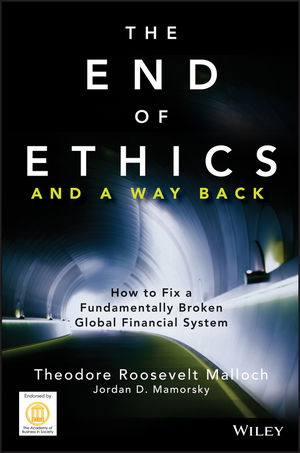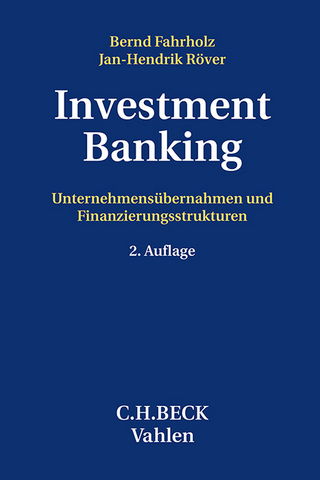
The End of Ethics and A Way Back
John Wiley & Sons Inc (Verlag)
978-1-118-55017-5 (ISBN)
- Titel ist leider vergriffen;
keine Neuauflage - Artikel merken
From Ponzi schemes to the credit crisis to the real estate bubble, the financial industry seems to have lost its way on the road to riches. As private greed continues to undermine the public good, one might wonder what ever happened to business ethics. And how can we reform the global financial system to benefit everyone, rather than just the very lucky few? In The End of Ethics and the Way Back, the bestselling author of Doing Virtuous Business teams up with attorney and Yale University Postdoctoral Fellow, Jordan Mamorsky to examine the most recent failures of business virtue, prudence, and governance from Bernie Madoff to Jon Corzine and MF Global before offering a set of structural and holistic solutions for our current ethical crisis in global finance.
Features compelling case studies that reveal the saturation of economic vice in global financeSuggests structural reforms to the global financial system that would increase confidence among consumers and encourage ethical behavior among finance professionalsWritten by Ted Malloch, author of the bestseller Doing Virtuous Business with attorney Jordan MamorskyIdeal for financial regulators, business students and academics, and professionals in the finance industry
Theodore Roosevelt Malloch is Research Professor for the Spiritual Capital Initiative at Yale University. He was Chairman and Chief Executive Officer of The Roosevelt Group, a leading strategic management and thought leadership company. He has served on the executive board of the World Economic Forum–Davos; has held an ambassadorial–level position at the United Nations in Geneva, Switzerland; worked in the U.S. State Department and Senate; worked in the capital markets at Salomon Brothers on Wall Street; and has sat on a number of corporate, mutual fund, and not–for–profit boards, including the University of Toronto International Governing Council, a Pew Charitable Trust board, and the Templeton Foundation. Ted earned his PhD in international political economy from the University of Toronto. Jordan D. Mamorsky is an experienced attorney specializing in business regulation, corporate governance, and compliance. He was a postdoctoral fellow at Yale University where his research focused on the legal, financial, and ethical failures that contribute to financial crisis, corporate illegality, and breach of legal fiduciary duties. Jordan formerly worked at the U.S. Treasury Department, where he received the "special act award" in recognition of his recommendations detailing the dangers of predatory subprime lending in low–income communities. He is a contributor to Morningstar Advisor. He is an active practicing attorney and has represented Fortune 500 companies, global investment banks, insurance companies, hedge fund managers, health services corporations and an international sports league, among other clients.
Foreword xvii
Acknowledgments xxix
Introduction xxxiii
Prologue xxxix
Part One: Economic Vice 1
Chapter 1 The Selfish Betrayal of the Global Investor: Libor and Its Consequences 3
The Calculation of Libor 5
The Rise and Fall of the World s
Financial Benchmark 8
Knowingly Asleep at the Wheel 13
A Troubling New Normal 16
Notes 17
Chapter 2 Jon Corzine s Fallen Empire of Risk: MF Global 19
History of MF Global 21
Jon Corzine s Midwestern Roots 22
The Rise of Fuzzy 23
The Establishment of MF Global 26
Rogue Trader Scandal 27
From Gubernatorial Disgrace to MF Global CEO 28
MF Global under Corzine 29
Risk Governance Failures 32
Notes 33
Chapter 3 The Continued Rating Agencies Game: Will Rating Agencies Be Reined in for the Sake of Global Market Stability? 37
History of Rating Agencies 43
Mortgages and the Ratings Boondoggle 47
Notes 51
Chapter 4 Belligerent Leadership and the Demise of Lehman Brothers 55
History of Lehman 57
Brewing Anger 60
Uncaging the Animal 62
Culture of Anger 64
Increasing Risk and Authority 66
Walsh s Rise 67
A Gorilla Bursting the Bubble 69
Extreme Leverage 71
The Deception of Repo 105 73
Fuld s Marginalization of Risk Management 75
Fuld s Last Chance to Save Lehman 77
Notes 79
Chapter 5 How Out–of–Control Pride Brought Down Bear Stearns 83
History of Bear 85
A Different PSD 89
Greenberg s Vision of Corporate Thrift at Bear Stearns 91
Bridge Bum Turned Bear Salesman and CEO 93
A Casino Culture 95
BSAM: Bear Stearns Kryptonite 98
Never a Losing Month 100
The End of Bear Stearns: The Importance of Golf and Bridge during a Liquidity Crisis 105
JP Morgan and the Takeover of Bear 106
Notes 107
Chapter 6 Tyco: Exceptional Greed and the Destruction of a Billion–Dollar Company 113
Tyco History 115
The Makings of a Bad CEO 117
Seeds of Greed 118
Kozlowski s Culture of Fear at Grinnel 119
Looting the Company 120
Kozlowski s Accomplices 124
A Convicted Piggy 128
Notes 128
Chapter 7 Insatiable Lust and Two of the Most Destructive Ponzi Schemes in American History 131
The Ponzi Scheme and Society 133
Bernie Madoff and the Seeds of Lustful Temptations 134
Madoff s Culture of Sexual, Criminal, and Moral Deviance 138
Tom Petters, the High School Dropout 139
Birth of the Ponzi Scheme, Petters Company Inc. 140
Succumbing to Uncontrollable Lust 141
Madoff s Cast of Characters 142
Petters Cast of Characters 151
Will We Witness Another Madoff ? 155
Notes 155
Chapter 8 HealthSouth and WorldCom: How a Gluttonous Appetite for Expansion Resulted in Accounting Fraud and Failed Corporations 161
HealthSouth 163
Bernie Ebbers and WorldCom 172
Blunting Future Accounting Fraud 178
Notes 179
Part Two: Recommendations 183
Chapter 9 Why Financial Regulation Has Failed, and What to Do about It 185
The Failed Promises of DoddFrank 185
The New Rules of the Game that Reinforce Vice 189
A Dummies Guide to Save the SEC 194
The Regulatory Reforms Necessary to Reverse the End of Ethics 195
Reforms Needed for the Commodities Market 202
The Need for Heightened and Streamlined Fiduciary Rules 205
Notes 208
Chapter 10 The Case for Reintroducing Governance and Morality 213
The Important Demand for Corporate Governance 213
The Importance of Corporate Responsibility 215
The Importance of Reputation and Avoiding Long–Term Litigation Costs 218
Bonuses Redux: Corporate Welfare Reform and Cutting Golden Parachutes 220
The Need to Morally Redefine Ourselves on the Macro Level 223
Rebuilding Our Character 226
How to Remedy the Evils in Modern–Day Consumerism 227
Virtue and the Moral Life 228
The Consequences of Modern Selfishness 230
Modern Theories and Institutions 232
Democratic Morality and Our Current Crisis 233
Notes 234
Chapter 11 The Way Back 237
Appendix 241
About the Authors 249
Index 251
| Erscheint lt. Verlag | 29.4.2013 |
|---|---|
| Verlagsort | New York |
| Sprache | englisch |
| Maße | 161 x 234 mm |
| Gewicht | 552 g |
| Themenwelt | Wirtschaft ► Betriebswirtschaft / Management ► Finanzierung |
| Wirtschaft ► Betriebswirtschaft / Management ► Unternehmensführung / Management | |
| Wirtschaft ► Volkswirtschaftslehre ► Finanzwissenschaft | |
| ISBN-10 | 1-118-55017-X / 111855017X |
| ISBN-13 | 978-1-118-55017-5 / 9781118550175 |
| Zustand | Neuware |
| Haben Sie eine Frage zum Produkt? |
aus dem Bereich


